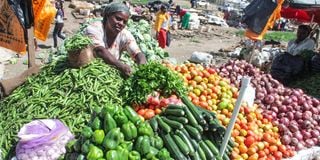Amid rising global tensions, enhance Africa food supply

A trader sells fresh farm produce at an open air market.
Rising global conflicts are disrupting food supply chains, and nations across Africa that rely on food imports are more at risk. However, market actors and governments can transform domestic food value chains now and develop sustainable solutions to balance imports.
Most foods that make up the bulk of the African diet, like grains such as rice and corn, is not grown here. The ‘staple’ foods are imported from all over the world. So, when the conflict in Ukraine began a hemisphere away, food prices went up; we all felt it.
Africa imports $45-$60 billion worth of staple foods yearly. As global tensions rise elsewhere, it also highlights our dependence on imported food. We can now collaborate and find alternatives so that our communities are less exposed to global shocks.
The solution is not as straightforward as ‘grow more food’: Those who grow it need investment and a place to sell. We must build a domestic market. Many small and medium enterprises (SMEs),even smallholder farmers, need help to do this. Investors often don’t prioritise support for smaller companies and the businesses often don’t have access to insights, contacts and data that open doors.
As an African-European, my work worldwide has made me passionate about transforming African food systems—enabling food security, increasing intra-Africa trade and creating jobs. I want to see Africa achieve food security through quadrupling investment, innovation and technical support for African food processors, SMEs and smallholder farmers to transform value chains and source locally.
Global trade is not the cause of the problem we are trying to solve: The imbalance is. The goal is not to shut off Africa from the world but foster local supply chains that stimulate economies and ensure domestic supply. Far from isolating us, this can even create the opportunity to grow exports to world markets, which we badly need in Africa.
First, identify the key players: Investors, potential buyers (‘off-takers’) and other enablers with a role in nourishing sustainable agriculture. SMEs and farmers, by choice, are ideal; youth, women and entrepreneurs who see sustainable and climate-smart farming as a business. Secondly, develop the market. Sustainable supply is almost only possible with first-built demand.
Partnering with off-takers to commercialise SMEs will enable them to buy from domestic suppliers, facilitating an emerging and stable market to grow healthily. Thirdly, facilitate access to finance. Set up a seed capital facility, work with investors and banks to offer affordable finance and provide SMEs and smallholder farmers a loan facility of $50,000 to $1million—usually a challenge for SMEs to get from commercial banks, which often prefer a client borrowing from $5 million upwards.
New markets don’t emerge in a vacuum. External factors easily influence them, and we can act to smooth the path ahead. Opportunities to expand free trade across Africa are an ideal example. The Southern African Development Community (SADC) and African Continental Free Trade Area (AfCFTA) are making good progress but more can be done to remove logistical and trade barriers.
In a market as fundamental as food, this can be invaluable; it could mean Ethiopia’s teff, Ghana’s fonio or Rwanda’s avocados are available to more people.
Data is essential for companies to make the most of these new opportunities. It helps you understand your customers and decide how much to produce, where to sell and pricing. This is especially important when considering the climate challenge. Poor technology and low investment in production amid erratic rains and disruptive weather patterns is already causing problems for Africa’s farmers.
Together, we can build a stable, secure and sustainable food supply for Africa and beyond.
- Mr Colley is the global director, value chains transformation, at IDH. [email protected].





